Defeat U.S. War on Afghanistan and Iraq!
Primary tabs
On December 1, President Barack Obama officially announced a massive escalation of the U.S. war on Afghanistan, tripling the number of American military personnel there since Obama took office. This move marks a decision by Washington to continue the colonial occupation of Afghanistan indefinitely, and with it the bloody slaughter of the Afghan people. Obama’s claim that he would “begin the transfer†of U.S. forces by mid-2011 was just sucker bait for gullible liberals. “Afghanistan Is Now Obama’s War,†proclaimed the media from New York to London to Mumbai. But Afghanistan has been the Democrats’ war since the moment it was launched, in September 2001, and together with the war on Iraq, it is a bipartisan imperialist war. No one in Washington thinks the Afghan puppet army will be able to handle the Taliban. The actual U.S. strategy is not to defeat the Taliban but to weaken it enough so that elements of the Islamists can be brought into a political deal. It is striking that in the United States, a majority of the population is turning against the war even though there hasn’t been a major national antiwar march in more than two years – ever since the start of the last presidential election campaign. At protests following Obama’s announcement of more troops to Afghanistan, organizers carefully avoided any signs mentioning the president by name. Our Internationalist contingent, in contrast, carried signs including, “Hey Obama, How Many Kids Did You Kill Today? Defeat Imperialist Slaughter in Afghanistan, Iraq.â€
![]()
December 2009
Imperialist Chief Obama: Deeper Into the Quagmire
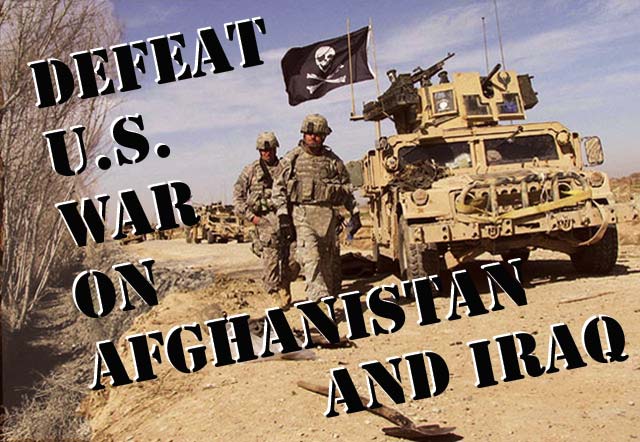
Break with the Democrats – For Workers Strikes Against the War!
On December 1, President Barack Obama officially announced a massive escalation of the U.S. war on Afghanistan. The 30,000 troops to be dispatched will bring U.S. forces in the country to 100,000, tripling the number of American military personnel there since Obama took office last January. Add in 36,000 NATO and other “coalition” troops and more than 100,000 “contractors” employed by the U.S. Beyond the sheer numbers, this move marks a decision by Washington to continue the colonial occupation of Afghanistan indefinitely, and with it the bloody slaughter of the Afghan people. Obama’s claim that he would “begin the transfer” of U.S. forces by mid-2011 was just sucker bait for gullible liberals, and a useless “signal” to the terminally corrupt and ineffectual Afghan puppet government. Key was his vow a couple of days earlier that he would “finish the job” in Afghanistan. Since the feckless Afghan “army” will not be battle-ready any time soon, if ever, what this means is that the U.S. will be bogged down in an Afghan quagmire, the dreaded “Q-word” that the bourgeois media didn’t dare utter.
“Afghanistan Is Now Obama’s War,” proclaimed the media from New York to London to Mumbai. The U.S. president certainly “owns” the Afghanistan war, as well as the ongoing war/occupation in Iraq. But that has been true since Day One of his administration. Immediately after the new imperialist commander in chief took office, U.S. troops killed 16 villagers in Afghanistan, U.S. Predator aircraft fired missiles killing 15 in Pakistan, and U.S. Special Forces executed a couple in Kirkuk, Iraq in front of their daughter. Afghanistan has been the Democrats’ war since the moment it was launched, in September 2001, when the U.S. Senate voted 98-0 and the House of Representatives voted 420-1 to authorize then-president George W. Bush “to use all necessary and appropriate force” against anyone he held responsible for the 9/11 attacks on New York’s World Trade Center and the Pentagon. And Democrats voted repeatedly to fund the war on Iraq, even after they won a majority in both houses of Congress in 2006. As we have repeatedly stressed, the war on Afghanistan and Iraq is a bipartisan imperialist war.
Obama’s long-awaited speech announcing the escalation and his “strategy” for the war, held before 4,000 West Point cadets and 40.8 million television viewers, was by every measure a dud. Pundits panned it, conservatives slammed it, opponents of the war damned it. But it’s not about a speech, or Obama’s extended “policy review,” which Republicans portrayed as gutlessness or dithering. It’s about a war that even after eight year the U.S. “superpower” can’t get a handle on. Already in February, the new president dispatched an additional 21,000 troops to Afghanistan, later increased to 30,000+, effectively doubling the size of the U.S. expeditionary force there. Yet it didn’t make a dent in the pace of attacks by the Taliban and other insurgent forces, which tripled from February to August. Even more worrisome to Washington, the areas under effective insurgent control have expanded from 20 percent to 40 percent of Afghanistan over the past two years. Last week, Admiral Mike Mullen, head of the U.S. Joint Chiefs of Staff, told an audience of Marines at Camp Lejeune in North Carolina straight-out, “We are not winning, which means we are losing” (London Telegraph, 10 December).
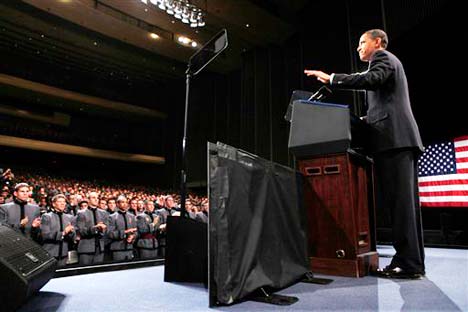 Imperialist commander in chief Barack Obama announces escalation of war on Afghanistan at West Point military academy, December 1. (Photo: Charles Dharapak/AP)
Imperialist commander in chief Barack Obama announces escalation of war on Afghanistan at West Point military academy, December 1. (Photo: Charles Dharapak/AP)
So now we have the spectacle of Obama receiving the Nobel “peace” prize (named after the Swedish arms manufacturer and inventor of dynamite!) and delivering his ridiculous “war is peace” speech while escalating the war on Afghanistan, as well as attacks on Pakistan. Though it was not mentioned at West Point, the U.S. president reportedly “signed off on a plan by the Central Intelligence Agency to expand C.I.A. activities in Pakistan” (New York Times, 2 December). This includes extending missile strikes against Al Qaeda and Taliban “targets” launched from Predator and Reaper drone aircraft, resuming attacks by special operations forces across the border from Afghanistan and from secret bases inside Pakistan, and stepping up clandestine activity by “contractors” such as the infamous Blackwater mercenaries (see Jeremy Scahill, “The Secret US War in Pakistan,” The Nation, 21 December). Now U.S. generals want to strike in the rebellious province of Baluchistan. This covert aggression against a supposed ally has provoked massive opposition. The London Guardian (2 December) reported: “Strikes that have killed at least 750 people in the past two years have provoked public hostility. Any move into Balochistan is likely to spark a fierce backlash.”
The liberal Democrat in the White House is no less an imperialist warmonger than his Republican predecessor. Under Obama, the notorious torture prison at Bagram air base north of Kabul continues to operate, the mercenary death squads are expanding, and the Air Force is still bombing wedding parties. From the moment his commander in Afghanistan, General Stanley McChrystal, demanded a big increase in U.S. forces, and then leaked his report to the press, there wasn’t the slightest chance that Obama would turn down the military. He has to resort to double-talk to sell this policy to the antiwar base that elected him (in a Gallup poll the week before his talk, 57 percent of Democrats favored reducing the number of U.S. troops in Afghanistan and fully half now think the U.S. was wrong to invade the country in 2001). He also needs to assuage Democratic Congressmen up for re-election in 2010, many of whom could be defeated simply if antiwar Democrats stay home. The U.S. population as a whole is increasingly fed up with the war. A September 2009 Pew Research Center poll showed 43 percent favored withdrawal from Afghanistan, and 49 percent thought the U.S. should “mind its own business” internationally, higher even than the 41 percent who took that view in the wake of the defeat in Vietnam.
Stuck with an unpopular, losing war, in his West Point speech, Obama tried to soft-soap the escalation with talk of a “transfer” of security to Afghan forces in July 2011. He immediately qualified this, saying the 2011 date is only a “beginning” and it would depend on “conditions on the ground.” But this didn’t please Republicans and military hardliners, so in the next few days, officials emphasized over and over that there would be no pullout. General McChrystal declared in Kabul that the timeline “is not an absolute.” NATO secretary general Anders Fogh Rasmussen stated in Brussels, “Transition doesn’t mean exit.” And on Sunday TV talk shows, there was a chorus from Obama administration officials. General James Jones, Obama’s National Security Advisor said, “We’re going to be in the region for a long time.” War secretary Robert Gates said that with 100,000 U.S. troops in Afghanistan in mid-2011, “some handful, or some small number, or whatever the conditions permit, will begin to withdraw at that time.” And Secretary of State Hillary Clinton vowed, “We’re not going to be walking away from Afghanistan again.”
So much for the illusion of the Democratic administration voluntarily pulling out of Afghanistan. To be sure, Obama said from the outset that he was not opposed to all U.S. wars, just “dumb wars” that the U.S. was bound to lose. During the 2008 election campaign he said he would increase U.S. troops in Afghanistan, and his advisors made it clear they intended to leave 50,000-plus U.S. forces in Iraq indefinitely. So anyone who thought Obama was an antiwar candidate fell for the hype about “hope” and “change” and didn’t read the fine print. The Democrats just thought that Bush and his dark-side vice-president Dick Cheney royally screwed things up with their stupidity, and the Dems could “do better.” At her Senate confirmation hearings as secretary of state, Clinton said the new administration would use “smart power” in diplomacy. (Like in Honduras, where the U.S. de facto supported the coup-makers?) As we wrote earlier this year about the Obama presidency:
“But there’s dumb … and dumber. Bush’s invasion and occupation of Iraq has drained U.S. military and economic strength in a quest for world domination. Obama’s vow to escalate the war in Afghanistan, spread over a far larger, mountainous territory, and at the same time to attack Pakistan, with eight times the population and the only Islamic country with nuclear weapons to boot, could set off a chain reaction that would send the entire region up in flames.”
– “Obama Presidency: U.S. Imperialism Tries a Makeover,” The Internationalist no. 28, February 2009
When Obama was elected – the first black president in the history of the United States, a nation founded on chattel slavery – tremendous hopes were placed in him by wide sectors of the population: African Americans, youth, workers and millions who were fed up with eight years of George W. Bush. If many thought they were voting to put an end to the debilitating wars in Iraq and Afghanistan and withdraw U.S. troops, this illusion was partly fostered by the “antiwar movement” that deliberately called off national peace marches in order not to embarrass the Democratic Party candidate. Also, most Democrats considered Afghanistan the “good war” as opposed to “Bush’s war” in Iraq, where they wanted to cut U.S. losses and head for the exit. Now that the U.S. is losing the war in Afghanistan and is mired in by far the worst economic crisis in three-quarters of a century, Obama responds … by digging in and escalating. This has left many of his supporters feeling angry and betrayed. But their anger will go nowhere so long as the mass of working people and antiwar activists remain tied to the Democratic Party.
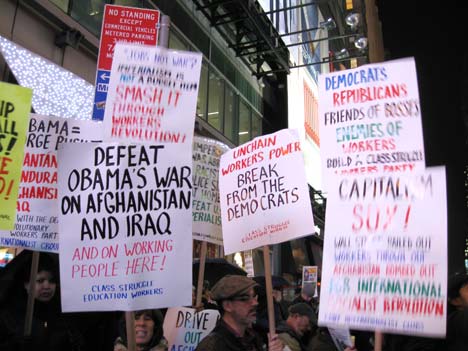 Internationalist contingent at December 2 Times Square New York City protest over U.S. escalation of war on Afghanistan. (Internationalist photo)
Internationalist contingent at December 2 Times Square New York City protest over U.S. escalation of war on Afghanistan. (Internationalist photo)
The Internationalist Group and League for the Fourth International did not support Democrat Barack Obama against Republican John McCain. We warned that on most fundamental issues – including the war, the bailout of Wall Street banks, education “reform” and other questions – the positions of the two capitalist contenders were barely distinguishable, if not identical. While much of the left made “social-patriotic” appeals to “bring the troops home” (and even more explicitly to “support the troops” by “bringing them home”), ever since September 2001 we called to defeat the imperialist war on Afghanistan, and later Iraq, while defending the Afghan and Iraqi peoples under U.S. attack. Rather than forming “antiwar” coalitions with bourgeois politicians, we called to break with the Democrats and for workers strikes against the war. Even at protests following Obama’s announcement of more troops to Afghanistan, organizers carefully avoided any signs mentioning the president by name. Our Internationalist contingent, in contrast, carried signs including, “Hey Obama, How Many Kids Did You Kill Today? Defeat Imperialist Slaughter in Afghanistan, Iraq.”
Imperialism is not a policy that can be discarded at will but a system that continuously generates poverty, racism and war. Any capitalist politician, pro-war or “antiwar,” will perpetuate it, whatever rhetoric they may spout on the campaign trail. The U.S. will withdraw from the Mideast only if it is forced out, by losses on the battlefield and class struggle “at home.” At bottom, the war is not over Saddam Hussein, or Osama Bin Laden, the Taliban, Al Qaeda or oil pipelines – it is a war for world domination. We can only put an end to the endless U.S. wars in Iraq, Afghanistan, the Philippines, Colombia, Yugoslavia, Vietnam, Korea and elsewhere if we smash imperialism through international socialist revolution.
U.S. Sinking in the Afghan Quagmire
In all the analysis in the media of Obama’s Afghanistan surge there has been hardly any mention of the terrible toll the U.S. war and occupation is taking on the Afghan population. The killing of civilians in air strikes seldom makes it into the press unless it is a really big massacre, like last May 5, when over 125 villagers were killed in a bombing raid. In such cases U.S. military spokesmen typically deny civilian casualties for a few days, then say their reports were “thinly sourced” (i.e., invented), and eventually own up to a small fraction of the dead, claiming the rest were “militants” and “extremists,” or were supposedly killed by the Taliban. The regular slaughter of smaller numbers, such as the killing of nine civilians (including several children) in Helmand province on November 5, seldom makes it into the press, in that case only because the villagers took the bodies to the provincial capital to show before burying them. According to official (United Nations) statistics, over 2,000 civilians were killed in Afghanistan from January to October, well ahead of last year’s toll. But the U.N. is just an appendage of the U.S./NATO “coalition” military and the actual numbers are undoubtedly far higher.
Afghans overwhelmingly oppose the war and the occupation, although no one asked their permission. In keeping with the modern-day imperialists’ voracious appetite for “metrics,” all sorts of agencies from the International Red Cross to the U.S. Republican Party are continually conducting “opinion surveys” in Afghanistan. This is absurd to begin with in a country where the bulk of the population lives in isolated rural areas, and in wartime when respondents will say what they think the people with the guns behind the surveyors want to hear. But in one of the few polls that even asked about the presence of foreign troops, an ABC survey in December 2008, barely a third said opinions toward the “coalition” forces were generally positive in their area, only 18 percent wanted more U.S./NATO troops, and 77 percent wanted an end to the air strikes. There have also been numerous demonstrations against the occupiers, such as in Kabul just this past December 9, when thousands of students blocked the Kabul-Jalalabad highway protesting the killing in nearby Laghman province. Did you read about that in the newspapers or see it on TV? No you didn’t, because the “free but responsible” imperialist press censors it.
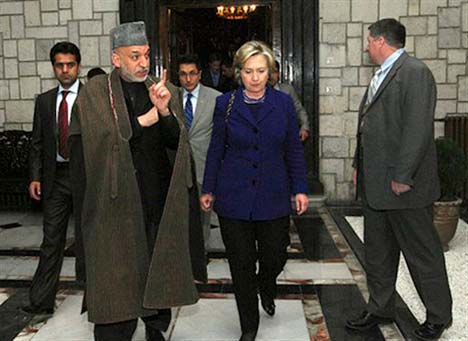 Afghan puppet president Hamid Karzai and U.S. puppet mistress Hillary Clinton in Kabul, November 2009. (Photo: U.S. embassy)
Afghan puppet president Hamid Karzai and U.S. puppet mistress Hillary Clinton in Kabul, November 2009. (Photo: U.S. embassy)
What the imperialist media and the U.S. government are concerned about is that “the central government of President Hamid Karzai … is widely seen here as corrupt and incompetent,” in the words of a London Guardian (2 December) report from Kabul. Democratic Congressman Jim McGovern of Massachusetts questioned sending more troops “defending a government that is corrupt and incompetent.” Both Obama and Clinton reportedly lectured Karzai on the need to fight corruption. But whoever heard of a puppet government that wasn’t corrupt? The regimes of Ngo Dinh Diem or Nguyen Van Thieu, heads of the Saigon “government” during the U.S. war on Vietnam, were hardly corruption-free. Even Nazi collaborator puppet “governments” in East Europe were rife with corruption. And why not? The politicians in Afghanistan and Iraq who serve as a quislings for the colonial occupiers are traitors who would face summary justice at the hands of any self-respecting nationalist government. So naturally, if they act as front men, their first question is “what’s in it for me?” Corruption is the grease that makes it possible for such criminal regimes to function at all. The Americans will never get an uncorrupt Afghan puppet.
A competent corrupt regime is another matter. That’s the kind of dictators the U.S. typically looks for in “Third World” countries: the Shah of Iran, Pinochet in Chile (who stole millions from the state treasury, while murdering tens of thousands of leftists), the air force officer turned hard-line politician Nguyen Cao Ky in South Vietnam (who ran the opium trade on CIA Air America planes). But Washington has a problem of even getting that in Afghanistan today. To have a military dictatorship, you have to have a military to provide the bureaucratic framework for bonapartist rule. But Afghanistan doesn’t. The Afghan army dissolved when the former Soviet-backed government fell in 1992. It was replaced by the warlords of the Northern Alliance who had been bankrolled by the U.S. A few years later they, in turn, were toppled by bands of Taliban, a creation of the Pakistani military’s Inter-Services Intelligence (ISI) agency. Unlike in Iraq – where after initially cashiering Saddam Hussein’s entire officer corps, the U.S. turned around and rebuilt the Iraqi army – in Afghanistan they are starting from scratch. It will take some years to turn the warlords’ private militias into a disciplined national army.
The U.S. has no intention of exiting Afghanistan, zero. It might like to mask its domination with a semi-colonial protectorate like the Hashemite monarchy Britain installed in power in Iraq in 1920, which stayed in power until 1958 while the British ran things from their air force bases. (This is what Washington has in mind for Iraq today.) But however they try to disguise it, the Obama administration is going to be occupying Afghanistan for years – five or ten minimum – unless it is driven out first. That time frame is what British and German ministers have admitted to when questioned in Parliament and the Bundestag, and that’s more or less what General David Petraeus, commander of the Central Command (covering Iraq and Afghanistan), told the U.S. Congress on December 9. And it will cost, a lot: Petraeus cited the figure of $10 billion a year to fund an Afghan army; Obama quoted $30 billion a year as the price tag for his “surge” of 30,000 more troops. The official cost of U.S. operations in Afghanistan this year will be $100 billion, or a million bucks for each of the 100,000 U.S. troops scheduled to be “in country” by July. And the bill isn’t getting any smaller any time soon.
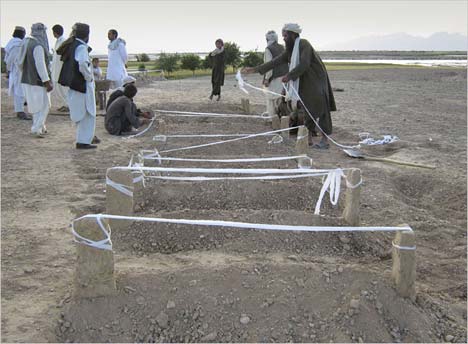 Fresh graves of villagers killed in May 5 U.S. air strike in Farah province, western Afghanistan, where more than 125 were killed, including many women and children. (Photo: AP)
Fresh graves of villagers killed in May 5 U.S. air strike in Farah province, western Afghanistan, where more than 125 were killed, including many women and children. (Photo: AP)
For now, the U.S. and 42 other members of the military “coalition” (formally known as the International Security Assistance Forces [ISAF]) that is occupying Afghanistan are stuck in a war that even they admit they are losing. In his August 30 Initial Assessment report as ISAF commander requesting a massive increase in U.S. forces, General McChrystal said bluntly:
“Failure to gain the initiative and reverse insurgent momentum in the near-term (next 12 months) – while Afghan security capacity matures – risks an outcome where defeating the insurgency is no longer possible…. [T]he overall situation is deteriorating despite considerable effort by ISAF. The threat has grown steadily but subtly, and unchecked by commensurate counter-action, its severity now surpasses the capabilities of the current strategy. We cannot succeed simply by trying harder….”
“Failure to provide adequate resources also risks a longer conflict, greater casualties, higher overall costs, and ultimately, a critical loss of political support. Any of these risks, in turn, are likely to result in mission failure….
“The insurgents control or contest a significant portion of the country, although it is difficult to assess precisely how much due to a lack of ISAF presence. … REDACTED”
The McChrystal report states that the prisons have been turned into Taliban-recruiting centers, and that the Taliban have displaced the Kabul government in many areas:
“The QST [Taliban operating out of Quetta, Pakistan] has a governing structure in Afghanistan under the rubric of the Islamic Emirate of Afghanistan. They appoint shadow governors for most provinces, review their performance, and replace them periodically. They establish a body to receive complaints against the own ‘officials’ and to act on them. They install ‘shari’a’ courts to deliver swift and enforced justice in contested and controlled areas. They levy taxes and conscript fighters and laborers. They claim to provide security against a corrupt government, ISAF forces, criminality, and local power brokers.”
No doubt the “redacted” parts of the report are even more explicit. A series of maps and charts published by Andrew Cordesman of the Center for Strategic and International Studies (CSIS), “The Uncertain Metrics of the Afghan War” (3 December) include a 2008 U.N. “accessibility map” showing almost the entire southern 40 percent of Afghanistan as a “no-go area” of “extreme risk/hostile environment” for aid workers. Other maps show the southern 60 percent of the country as areas “with permanent Taliban presence,” and much of the east as “extreme risk” as well. And now the Taliban control areas in the north around Kunduz.
Obama’s “Strategy”: Looking for the “Good Taliban”
So Obama gave McChrystal what he asked for: the 30,000 troops, with a few thousand more from the U.S.’ “allies” (in several cases paid for by the U.S. as part of the Global War on Terror, or GWOT in Pentagonese), essentially fulfills the general’s request for 40,000. In any case, it was all that was available: the U.S. Army and Marines currently have total active duty combat forces of around 500,000, and by mid-2010, fully half of those will be deployed in and around Iraq and Afghanistan. The rest are on duty in other “theaters” (Philippines, Colombia), assigned to the 700+ U.S. military bases in 156 countries worldwide, retraining, and/or getting ready for their next tour of duty in the war zone. The fact is that the U.S. is at the limits of its “force projection” capability without introducing a draft (military conscription).
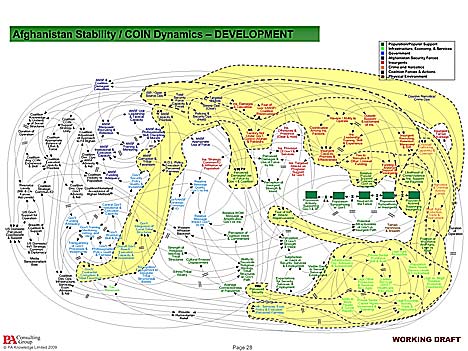 No wonder they're losing. Slide from PowerPoint presentation for U.S. Joint Chiefs of Staff on counterinsurgency (COIN) strategy in Afghanistan.
No wonder they're losing. Slide from PowerPoint presentation for U.S. Joint Chiefs of Staff on counterinsurgency (COIN) strategy in Afghanistan.
The “new” Afghanistan strategy is described as “counterinsurgency” (COIN) aimed at holding off the Taliban, rather than “counterterrorism” (CT) focusing on destroying Al Qaeda. While talking of “protecting the population,” what it seeks to “protect” it from is “a resilient insurgency and a crisis of confidence in the government.” What the COIN strategy argues, in General McChrystal’s words, is that “the population … must be leveraged” … to protect the government from the people.
The additional U.S. forces are to be deployed almost entirely in a few provinces in the south (Helmand and Kandahar) and the east (Khost), while pulling back exposed “forward operating bases” and forming a “ring of steel” around the capital. The tiny outposts in hostile territory could only be defended by calling in air strikes, which were becoming a major liability due to mounting civilian casualties. What this shows is that the military planners are seeking to buy time, to halt the insurgents’ advance and prevent Kabul from falling to the Taliban in the next six to 12 months. So McChrystal wasn’t exaggerating, and the imperialist occupiers really are in deep trouble. This, however, raises the question – that has been hotly debated for the last week – of how the U.S. could even begin a “transfer” of security to Afghan forces in a mere 18 months.
No one in Washington thinks the Afghan puppet army will be able to handle the Taliban by then. They will grab their spoils and run. So are the Obama administration and the Pentagon chiefs raving idiots and lily-livered weaklings as Republican right-wingers contend? Not at all. The administration argues that “the Taliban is a deeply rooted political movement in Afghanistan” that cannot be eliminated militarily, according to a top official quoted by the Washington Post (10 October). The actual U.S. strategy is not to defeat the Taliban but to weaken it enough so that elements of the Islamists can be brought into a political deal. The McChrystal report is explicit:
“Insurgencies of this nature typically conclude through military operations and political efforts driving some degree of host-nation reconciliation with elements of the insurgency. In the Afghan conflict, reconciliation may involve GIRoA1-led, high-level political settlements…. ISAF must be in position to support appropriate Afghan reconciliation policies.”
This isn’t about “reintegrating” low-level Taliban fighters. Washington is angling for a “high level political settlement” with the “good Taliban.”
Some months ago the New York Times (8 March) reported, “President Obama declared in an interview that the United States was not winning the war in Afghanistan and opened the door to a reconciliation process in which the American military would reach out to moderate elements of the Taliban, much as it did with Sunni militias in Iraq.” Since then the search has been on for the “moderate Taliban.” Could this be the Haqqani network, whose founder, Jalaluddin Haqqani, has been well-known to the Americans (and the Pakistani ISI) since he was a mujahedin commander in the anti-Soviet war? Alas, the Haqqanis are in tight with Al Qaeda. Could the elusive “good Taliban” be Gulbuddin Hekmatyar, “the sociopathic former Afghan Prime Minister who pulverized Kabul during the post-Soviet fall-out amongst mujahedin thieves in the early 1990s” (Tom Burghardt, “America’s Search for the ‘Good Taliban’,” Global Research, 15 March)? Hekmatyar, another top recipient of CIA aid in the ’80s, was notorious for throwing acid in the faces of unveiled women students at Kabul University. But Hekmatyar is a leading drug kingpin, and has been for decades, which could prove an embarrassment for Washington.
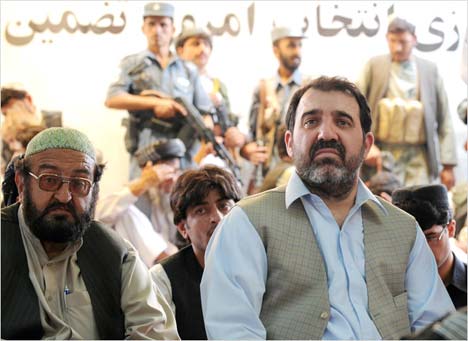 Corruption in Afghan puppet government? Shocking! But main agent of corruption in Kabul regime, Ahmed Wali Karzai (at right), the president's brother, turns out to be on the CIA payroll. (Photo: Banaras Khan/AFP)
Corruption in Afghan puppet government? Shocking! But main agent of corruption in Kabul regime, Ahmed Wali Karzai (at right), the president's brother, turns out to be on the CIA payroll. (Photo: Banaras Khan/AFP)
The U.S. figures the Taliban are not a regular military formation such as the former Baathist military who started the insurgency in Iraq. Also, Obama argued at West Point, it is not a mass-based insurgency such as the Vietnamese National Liberation Front. So maybe the Kabul regime can be propped up for a time with massive force. However, what form a “reconciliation” might take is unclear: a revolt of deputies of Mullah Omar, a break-away of groups more interested in local control than Taliban/Al Qaeda-style Islamism? The Washington Post reports, “Some inside the White House have cited Hezbollah, the armed Lebanese political movement, as an example of what the Taliban could become.” The White House insiders consider “although Hezbollah is a source of regional instability, it is not a threat to the United States.” The condition would be that they break from Al Qaeda, and possibly hand over Omar bin Laden, if he’s still around, and Ayman Al-Zawahiri, one-time chief of the Egyptian Islamic Jihad, bin Laden’s chief deputy and the real leader of Al Qaeda. But whatever the scenario, whether Washington can stabilize its “corrupt and incompetent” puppet government sufficiently and pull off such a deal is dubious.
A major U.S. liability in Afghanistan is Hamid Karzai, the man it picked as a figurehead president, and the tattered regime he heads. Karzai was installed to give a Pashtun face to a “government” of the Tajik warlords of the Northern Alliance, who control the army and police, such as they are. Taliban influence has grown because the Pashto-speaking clans and tribes of southern Afghanistan regard the Kabul authorities as an alien force. The massive fraud in the August 2009 Afghan elections was because in the South, Karzai’s supposed base, security was so tenuous and popular hostility to the government so great that there was no vote at all in much of the region. So they simply stuffed the ballot boxes. Pashtun rulers dominated Afghanistan from 1747 until the overthrow of the last king in 1973. But whether they yearn for a “Pashtunistan” including the 40 million Pashto speakers of southern Afghanistan and western Pakistan, or for an ultra-fundamentalist Islamic emirate, the common denominator is hatred of the U.S. occupation, and what “holds the disparate Taliban factions together is opposition to Tajik dominance in Kabul,” as liberal imperialist Asia “expert” Selig Harrison wrote (New York Times, 17 August).
For Permanent Revolution Throughout Central and South Asia
Beyond the uncertain prospect of an alliance with sections of the Taliban, the other big sticking point of Obama’s “strategy” is what he barely mentioned at West Point: nuclear-armed Pakistan. More than 80 U.S. missile strikes inside Pakistani territory in the past two years, Pentagon plans for more “special operations” inside Pakistan, the prospect that more American troops will push the Afghan Taliban deeper into Pakistan, and Washington’s heavy-handed pressure on the tottering Pakistani president Asif Ali Zardari and army chief General Ashfaq Parvez Kayani have sparked overwhelming sentiment against the Obama administration in Pakistan. Clearly, Islamist reactionaries and right-wing militarists could capitalize on this sentiment. But Pakistan, unlike Afghanistan, has a sizable working class, and at least elements of a leftist labor movement. Internationalist communists would seek to seize this moment to wage genuine anti-imperialist, proletarian revolutionary struggle – against the U.S., its client Zardari, the Islamist generals who have been the real power in Pakistan since its foundation, and the semi-feudalist landlords who still dominate the political parties – and thereby compete with the Taliban’s appeal to the “wretched of the earth.”
While the weight of oppression on the toilers of Afghanistan is enormous, it must be recognized that the social forces inside Afghanistan that could be a base for revolution are weak. This is one of the most impoverished countries in the world, and its economy has been further devastated by decades of war, to the point that there is hardly any industry at all. Nevertheless, Trotsky’s perspective of permanent revolution holds true here as well: in this era of imperialism, of decaying capitalism, even the democratic gains of the bourgeois revolutions (democracy, agrarian revolution and national liberation) can only be realized through the taking of power by the working class, led by its communist party, which proceeds to carry out socialist tasks. In Afghanistan today, any revolutionary push is likely to come from without, but that is far from impossible. With neighboring Pakistan and Iran in turmoil, the potential for socialist revolution in the region is real, and could join with protests inside Afghanistan against the occupation evolving into a struggle against imperialist domination.
The League for the Fourth International calls for the defeat of the imperialist war on, and colonial occupation of, Afghanistan and Iraq. Following the example of Lenin and Trotsky, we stand on the side of the semi-colonial peoples against imperialism, and with those resisting the occupiers – who are by no means limited to Taliban, Al Qaeda or other Islamists. Many, particularly in the capital, look back favorably to the pro-Soviet government when unveiled women could walk the streets and were the majority of students in Kabul University. While hailing any real blows landed against the occupiers and their Afghan and Iraqi puppets, working-class militants oppose sectarian attacks on Sunni, Shiite, Christian, Buddhist and various minority communities. And we give no political support to the various bourgeois opposition forces, which are often as reactionary as the Baghdad and Kabul “governments.” Communists fight for education for all, for full equality for women, including freedom from the veil and other restrictions, and defend the rights of nationalities, including the right to self-determination (independence), such as for the Baluchis. Proletarian internationalists are anti-imperialists, not Afghan or Pakistani nationalists.
Revolutionary communists oppose the political manifestations of all forms of religious fundamentalism, whether Christian, Jewish, Muslim, Hindu, Buddhist, etc. In fighting for workers revolution that unites all the toilers, we are for a secular state and against an Islamic republic in Afghanistan, Pakistan, Iran, Iraq or anywhere else, just as we oppose a Jewish state in Palestine or a Christian state in Europe in the U.S. We seek to break the stranglehold of religious forces on education, medicine and public life in different countries. As avowed atheists, Marxists seek to overcome through social development and scientific enlightenment the prejudices and obscurantism that characterize all religions. And where religious fanaticism becomes a reactionary military force, we seek to mobilize the working class to fight it, while at the same time opposing the bourgeois militarists who sometimes oppose (and sometimes ally with) the fundamentalists, as for example in Algeria.
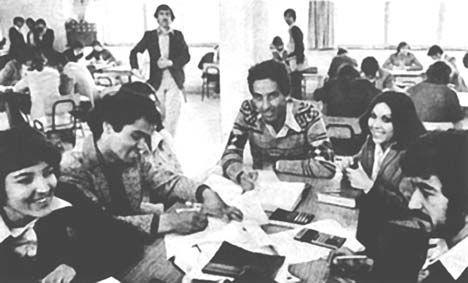 During the 1980s when Soviet-backed secular government was in power, majority of students at Kabul University were women. Maoist and social-democratic reformists hailed Islamic mujahedin (holy warriors) on CIA payroll who killed teachers, threw acid on faces of unveiled women. Trotskyists hailed Red Army intervention, calling for gains of October 1917 Revolution to be extended to Afghan peoples.
During the 1980s when Soviet-backed secular government was in power, majority of students at Kabul University were women. Maoist and social-democratic reformists hailed Islamic mujahedin (holy warriors) on CIA payroll who killed teachers, threw acid on faces of unveiled women. Trotskyists hailed Red Army intervention, calling for gains of October 1917 Revolution to be extended to Afghan peoples.
Authentic Trotskyists opposed the Islamists when they were used as pawns by Washington against the Soviet-backed reform government in Kabul from 1979 on. At the time, most of the left joined the U.S. government, first under Democrat Jimmy Carter and then under Republican Ronald Reagan, in hailing the mujahedin (Islamic holy warriors) who are now the backbone of the U.S. puppet “government” in Kabul. We hailed the Red Army intervention and stood for defense of the Soviet Union in the Cold War fought by proxy in Afghanistan, calling for the extension of the gains of the October 1917 revolution to the Afghan peoples.2 When the Kremlin ignominiously withdrew from Afghanistan in 1989, we offered to form an international brigade to fight against the U.S.-financed, armed and trained Islamic mercenaries. Thus we opposed the Islamists in the past when they were allied with the U.S., and we will oppose them tomorrow as Washington again seeks “reconciliation” with a section of the Taliban. And when Muslim forces rise up against imperialist domination, we continue to oppose Islamism politically while supporting any real struggles against the invasion and colonial occupation.
Not an Antiwar “Popular Front” But Class Struggle to Defeat the War on Working People Worldwide
It is striking that in the United States, a majority of the population is turning against the war even though there hasn’t been a major national antiwar march in more than two years – ever since the start of the last presidential election campaign. A recent CNN poll reports that not even one in five (19 percent) think that Obama deserved a peace prize, and 43 percent think he will never deserve it. So now that his own supporters are feeling jobbed, we are beginning to hear a few peeps from the quiescent “peace movement.” Thirty-four organizations have gotten together to plan a march in Washington … next March 20. We have insisted that this “movement” is nothing but bourgeois pressure politics, “lobbying in the streets,” a class-collaborationist “popular front” beholden to the Democrats. Here we have another proof: the fact that the protest will not be until months after Obama’s “surge” makes it perfectly obvious that this is a ritual gesture. All those liberals who vowed to “hold Obama’s feet to the fire” while calling for his election, and the reformists who celebrated his victory, figure they have to do something in order not to appear totally hypocritical. In American shorthand it’s called CYA.
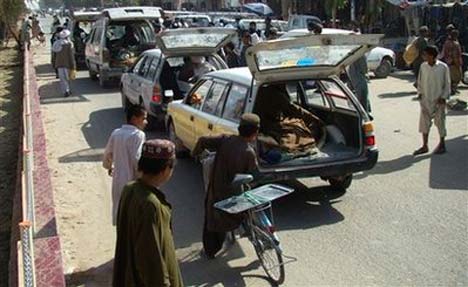 Cars bring bodies of villagers killed by U.S. airstrike in Helmand province to place in front of governor's house, November 5. (Photo: Abdul Khaleq/AP)
Cars bring bodies of villagers killed by U.S. airstrike in Helmand province to place in front of governor's house, November 5. (Photo: Abdul Khaleq/AP)
Meanwhile, they are still cozying up to the commander of U.S. imperialism. In Afghanistan, angry villagers chant “death to Obama” as they place the bodies of women and children killed by U.S. commandos in front of the provincial governor’s house. In the U.S., the leaders of every major “antiwar” group sent a November 30 letter to Obama pleading with him: “Polls indicate that a majority of those who labored with so much hope to elect you as president now fear that you will make a wrong decision – a tragic decision that will destroy their dreams for America.” This pro-Obama letter was signed by Brian Becker (ANSWER Coalition [Party of Socialism and Liberation]), Medea Benjamin (Code Pink [Green Party, Progressive Democrats of America]), Leslie Cagan (United for Peace and Justice [Committees of Correspondence]), Sara Flounders (International Action Center [Workers World Party]), Jeff Mackler (National Assembly to End Iraq and Afghanistan Wars and Occupations [Socialist Action]) and others. Obama is an imperialist war criminal drenched with the blood of Afghan babies and these fakers are talking about his “tragic” decision that will destroy “dreams for America”! What social-patriotic crap!
The various leftist groups behind the competing antiwar “coalitions” reacted to Obama’s escalation of the war on Afghanistan with their ever-so-slightly different formulas, all aimed at cajoling the dissident Democrats they’re always chasing after. The International Socialist Organization (ISO), focused on “Answering Obama's Afghanistan deceptions” (Socialist Worker web site, 8 December) with quotes from “liberal establishment” figures like Garry Wills, Rachel Maddow and The Progressive. The Party for Socialism and Liberation (PSL) added a pinch of soft-core “anti-imperialism” to spice up its appeal to bourgeois defeatism: “Afghanistan and the logic of empire: Concealing defeat in a war that cannot be won” (PSLweb.org, 6 December). Workers World Party (WWP) made its usual pocketbook pitch: “the increased costs of the war will come directly from funds that could be used to provide jobs and services for unemployed workers at home.” But it objects to the media calling it “Obama’s war” when “the Pentagon is in charge,” and highlights a chant, “Obama, Obama, yes we can, U.S. out of Afghanistan!” (Workers World, 17 December). Author William Blum skewered this talk of a “peace candidate” become war president in an article on “Yeswecanistan” (Counterpunch, 10 December).
For its part, Bob Avakian’s Revolutionary Communist Party (RCP), is currently on a “left” kick after losing the liberal Democrats it courted with its “World Can’t Wait – Drive Out the Bush Regime” front group. An article on “Obama’s War Speech” in the RCP’s Revolution (13 December) goes back to the earlier (1980-89) U.S. war on Afghanistan, quoting Democratic president Jimmy Carter’s national security advisor, Zbigniew Brzezinski about how Washington secretly funded Islamist groups in order to “induce a Soviet military intervention.” True. What the article leaves out is that back then, the RCP praised the “resolute struggle of the Afghani people for their freedom” against the Soviet Union (which it branded “a fascist state”) and said nothing about the imperialist aid flowing to the mujahedin (“Superpowers Square Off Over Afghanistan,” Revolutionary Worker, 11 January 1980). Along with the Mao-Stalinists of the RCP, the social-democratic ISO also sided with the CIA’s Islamic “holy warriors,” declaring at the time of the Soviet withdrawal: “The Mojahedin victory will encourage the opponents of Russian rule everywhere in the USSR and Eastern Europe” (Socialist Worker, 4 February 1989).
In contrast, at a December 2 demonstration in New York City the day after Obama’s West Point speech, a highly visible Internationalist contingent put forward a Trotskyist perspective of class struggle against imperialist war. Our signs included: “Drive U.S. Out of Afghanistan and Iraq! Hands Off Pakistan!” “Defend Iran Against U.S.-Israeli Nuke Threats!” “Israel Out of Gaza and the West Bank – Defend the Palestinian People!” “Break with the Democrats – For Workers Strikes Against the War!” “Full Citizenship Rights for All Immigrants!” and “For Black Liberation Through Socialist Revolution!” In response to the IAC/WWP demonstration organizers’ call for butter instead of guns, we said: “Jobs Not War? Imperialism Is Not a Budget Item – Smash It Through Workers Revolution!” We emphasized “Obama’s U.S.A.: Prison Nation. Mumia Abu-Jamal, Lynne Stewart, Leonard Peltier, and Thousands More. Free All Class War Prisoners!” And: “Down with the Democrats and Republicans – Imperialist War Parties, For a Revolutionary Workers Party.”
At present there is a severe worldwide capitalist economic crisis on top of a drawn-out losing imperialist war. This conjunction cries out for intervention by revolutionaries. The liberals, and the reformists who love them, see the connection as a choice of priorities for the government: “butter or guns” in the classic phrase of German social democracy. This reflects deep illusions in the class nature of the state. What the government will spend money on is not up for democratic decision but depends on the needs of capital. If Washington spent less on the Afghanistan war, any extra would go to propping up banks rather than improving schools. The priorities argument also reveals a fundamental misunderstanding of the nature of capitalism: even if they did spend more on jobs instead of war, it would not restart the stalled economy. This crisis is not one of “underconsumption” that can be solved by simply pumping more money into the economy, but of overproduction of capital. Capitalists refuse to invest because they can’t get an “adequate” return on their investments (the falling rate of profit). So instead they sink their money into one speculative bubble after another, until it comes crashing down. When it does, the government – their government – bails them out.
The real connection between the war and the economic crisis is the need for sharp class struggle against both, since both are expressions of the bankrupt capitalist-imperialist system. To put a stop to the endless cycle of wars and the boom-bust economy, nothing less than a socialist revolution to overthrow the rule of the bourgeoisie is required. This is particularly visible when you have 20 million jobless in the United States and the U.S. is in the ninth year of a war without end that even the Pentagon admits it is losing. The answer is not one more peace crawl to beg Congress or the White House for a few more crumbs, but mobilizing the working class against capitalism. That is why the Internationalist Group calls for workers strikes against the war – as well as for transport workers to “hot cargo” (refuse to handle) war materiel, and for militant labor action such as plant occupations and a fight for a shorter workweek with no loss in pay to combat unemployment. When on May Day 2008 the International Longshore and Warehouse Union shut down every port on the U.S. West Coast to stop the war in Iraq and Afghanistan and to defend immigrants, that was a small taste of the kind of class struggle we need.
The struggle against imperialist war and capitalist economic crisis must also oppose the escalating repression which the ruling class requires in order to keep down its wage slaves “at home.” As an IG sign at the December 2 Times Square protest declared: “Imperialist War Abroad = Racist Police State ‘At Home’ – Defeat U.S. Imperialism!” The Obama administration has not closed down the Guantánamo torture-prison, and is it continuing warrantless wiretaps and other attacks on civil liberties authorized by the U.S.A. PATRIOT Act (and earlier repressive legislation by the Democratic Clinton administration). Now it is gearing up for a new crescendo of “terrorism” scaremongering … just as the U.S. steps up terror bombing of Afghanistan and Pakistan. Obama justified the Afghan war by linking it to the 9/11 bombing of the World Trade Center and Pentagon, even though not a single Afghan was among the bombers, and the attack was reputedly planned in Hamburg, Germany not Tora Bora, Afghanistan. Hysteria around the upcoming trial of the alleged “9/11 mastermind,” to be held in downtown New York City, will doubtless be used to justify a new crackdown here.
Obama clearly did the electoral math in calculating the fallout from his Afghan escalation. He wrote off big chunks of the Democrats, figuring the Republicans would have to support him. He also is counting on liberal Democrats to support his health care “reform,” which is really a giant giveaway to the insurance companies, because they will have “nowhere else to go.” Of course, this strategy of trying to “govern from the center” by straddling the party divide (the Clintons called it “triangulation”) runs the risk of collapse if anyone decides not to go along. We will see when the war budget comes up for a vote. But at bottom, there is no way out so long as the working class and oppressed black, Latino and Asian are tied to the Democratic Party, the bourgeoisie’s party of choice in times of war and economic crisis when the ruling class must call for “sacrifice” from those it exploits and oppresses. In order to put an end to the slaughter on the battlefield and the jobs massacre here, we need to begin organizing a workers party to lead the class struggle for socialist revolution. That, as American Trotskyist leader James P. Cannon wrote, is “the only road to a stable and enduring peace for the people of the world.”
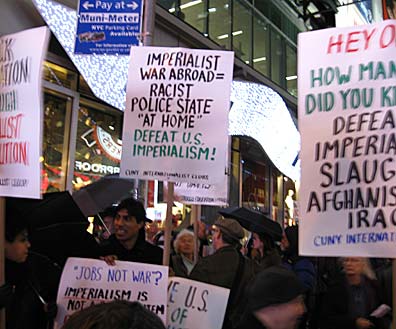 Another IG sign read: “Free Lynne Stewart, Mumia Abu-Jamal, Leonard Peltier! No Justice in the Capitalist Courts!” (Internationalist photo)
Another IG sign read: “Free Lynne Stewart, Mumia Abu-Jamal, Leonard Peltier! No Justice in the Capitalist Courts!” (Internationalist photo)
As a sign of the CUNY Internationalist Clubs at the December 2 NYC protest read: “Capitalism Sux: Wall Street Bailed Out, Workers Thrown Out, Afghanistan Bombed Out. For International Socialist Revolution!” ■
1 Government of the Islamic Republic of Afghanistan, i.e., the Kabul regime.
2 See “U.S. Sponsors the Enslavers of Afghan Women,” The Internationalist No. 12, Fall 2001.
To contact the Internationalist Group and the League for the Fourth International, send e-mail to: internationalistgroup@msn.com









